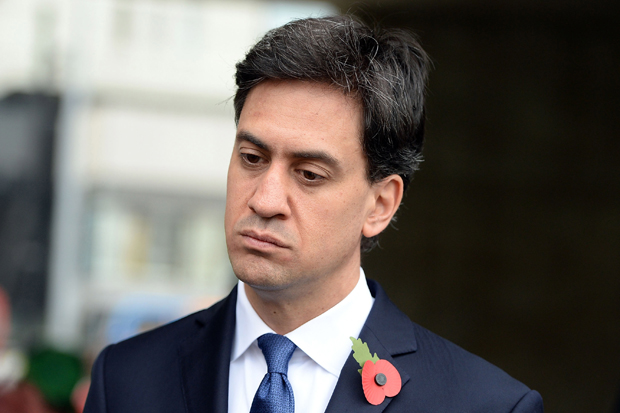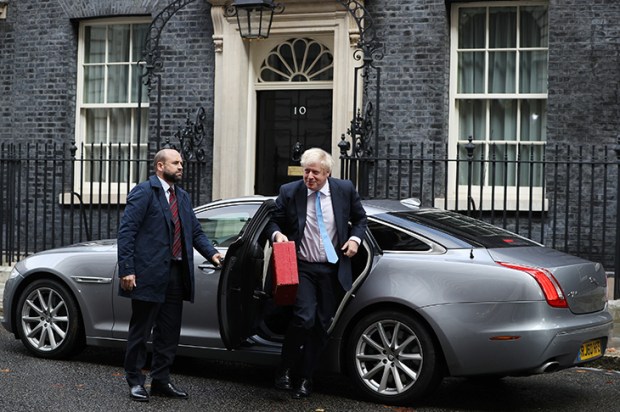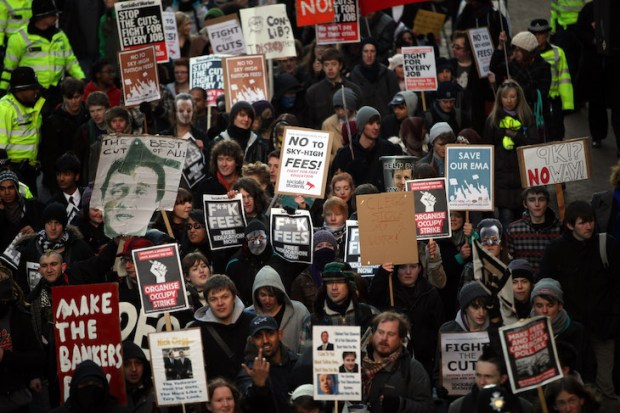Ed Miliband’s internal critics used to complain that he had a 35 per cent strategy. They claimed that his unambitious plan was to eke out a technical victory by adding a chunk of left-wing Liberal Democrats to the 29 per cent of voters who stayed loyal to Labour in 2010. Those close to Miliband were infuriated by this attack, insisting that their election strategy was far more expansive. Today, however, 35 per cent would sound pretty good to Labour, now becalmed in the low thirties in the polls.
Miliband might never have had a 35 per cent strategy. But he did have a strategic insight that makes Labour’s current predicament all the more striking: he was determined to keep the left united. He realised that the coalition gave Labour a chance to realign British politics; to reunite the left in support of a single party. Add to this the split on the right between the Tories and Ukip, and it was possible to see how Miliband could have the same electoral advantage that Thatcher had in the 1980s when her opponents’ vote was divided. Miliband, who is as ideologically certain as Thatcher was, saw this as his great opening.
But look at the numbers and Miliband’s grand plan to unify the left is in deep trouble. A recent poll that had Labour down as low as 29 per cent put the Greens on 6 per cent. Now this Green advance is far less dramatic than the Ukip surge. But it is important electorally, particularly given that Miliband has been a darling of green groups. He courted them hard when he was energy and climate change secretary and carried on the relationship as Labour leader. Indeed, even when he announced his plan to freeze energy prices in 2013 — a thoroughly un-green idea — they bit their tongues out of admiration for him. Miliband, for his part, used his most recent conference speech to commit himself again to decarbonising Britain’s electricity supply by 2030, a foolhardy and expensive proposition beloved of environmentalists. But Miliband’s personal commitment to the green agenda has not been sufficient to stop the rise of the Greens.
The Greens, though, are only one part of Milband’s flank problem. In Scotland, the SNP — whose move to the left will only pick up pace under Nicola Sturgeon’s leadership — are threatening to knock over a slew of Labour seats in 2015.
So, how did this 50p tax rate-supporting, anti-Iraq war, pro-green politician end up with a problem on his left? Well, one answer is that this is all part of the great turn away from the established parties. Those close to Miliband do not deny that they face a crisis. Yet they argue, quite reasonably, that the disaggregation of politics is a crisis for all the established parties. After all, the same poll that had Labour on 29 per cent put the Tories on just 30 per cent; other surveys have Labour ahead, and Cameron is heading for his second by-election loss of the autumn to Ukip in Rochester. Indeed, both Labour and the Tories console themselves with the thought that the other party’s position is even worse.
But the worry for Labour is that this trouble on the left is, in part, a reaction to their leader. Public opinion about him seems to be calcifying. It is particularly alarming for Labour to find their leader with worse ratings in some polls than Clegg, a man who they have gleefully mocked for the last four and a half years for his unpopularity.
This is not all Miliband’s fault, by any means, even if he has been the author of some of his own misfortune. He is bearing the brunt of the anti-politics tide that is buffeting Westminster. Cameron is protected from the worst of this by his office, but Miliband gets the full force of it. Even some of who sympathise with the Labour leader worry that criticism of him has gone from being a political thing to a cultural meme.
I understand that Miliband is planning to respond to this crisis as he has previous ones: by making a speech. In the past, Miliband has delivered addresses good enough to silence his critics — albeit temporarily — and help him regain the political initiative. But with only six months to go to polling day, it is debatable whether another oration is what Miliband needs. This is especially true as it was this year’s conference speech that marked the beginning of his awful autumn.
Nevertheless, in previous difficult times speeches have got Miliband out of trouble. There is also something ironic in his current predicament in that Miliband was aware before many other Westminster politicians of several of the forces that are riling British politics. In the Labour leadership contest he talked eloquently about how the constant focus on swing voters had left many feeling alienated from politics. He was determined to make arguments from first principles again, to make sure that no one could say that the main parties are all the same. Yet the left seems unresponsive to Miliband’s determination to put clear water between Labour and the Tories.
One cause for hope for the Milibandites is that the Americans are coming. David Axelrod, a guru to Barack Obama who was signed up by Labour to much fanfare earlier this year but has not been much in evidence recently, will be heading to these shores soon. Arnie Graf, the community organiser whose work has so impressed Miliband, is also due to return to Britain shortly.
But what is alarming for Labour is that it is not obvious how they pull out of this downward spiral. Opposition parties rarely put on votes in the last few months of a parliament and Miliband has already fired several of his best policy shots.
‘The pieces have all been thrown up in the air and we don’t know where they are going to land,’ admits one member of Ed Miliband’s inner circle. The great challenge for the Labour leader is to seize this moment of flux to reshape politics to his advantage. Favourable constituency boundaries and the Tories’ Ukip problems mean that Miliband is not in as dire trouble as a first glance at the polls suggests. But he won’t find the answers to his problems on Hampstead Heath or Primrose Hill. He needs an electoral proposition, not an anecdote.
Got something to add? Join the discussion and comment below.
Get 10 issues for just $10
Subscribe to The Spectator Australia today for the next 10 magazine issues, plus full online access, for just $10.
You might disagree with half of it, but you’ll enjoy reading all of it. Try your first month for free, then just $2 a week for the remainder of your first year.















Comments
Don't miss out
Join the conversation with other Spectator Australia readers. Subscribe to leave a comment.
SUBSCRIBEAlready a subscriber? Log in